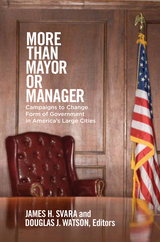
Different forms of city government are in widespread use across the United States. The two most common structures are the mayor-council form and the council-manager form. In many large U.S. cities, there have been passionate movements to change the structure of city governments and equally intense efforts to defend an existing structure. Charter change (or preservation) is supported to solve problems such as legislative gridlock, corruption, weak executive leadership, short-range policies, or ineffective delivery of services. Some of these cities changed their form of government through referendum while other cities chose to retain the form in use.
More than Mayor or Manager offers in-depth case studies of fourteen large U.S. cities that have considered changing their form of government over the past two decades: St. Petersburg, Florida; Spokane, Washington; Hartford, Connecticut; Richmond, Virginia; San Diego, California; Oakland, California; Kansas City, Missouri; Grand Rapids, Michigan; Dallas, Texas; Cincinnati, Ohio; El Paso, Texas; Topeka, Kansas; St. Louis, Missouri; and Portland, Oregon. The case studies shed light on what these constitutional contests teach us about different forms of government—the causes that support movements for change, what the advocates of change promised, what is at stake for the nature of elected and professional leadership and the relationship between leaders, and why some referendums succeeded while others failed. This insightful volume will be of special interest to leaders and interest groups currently considering or facing efforts to change the form of government as well as scholars in the field of urban studies.

The prevailing notion that the best government is achieved through principles of management and business practices is hardly new—it echoes the early twentieth-century "gospel of efficiency" challenged by Dwight Waldo in 1948 in his pathbreaking book, The Administrative State. Asking, "Efficiency for what?", Waldo warned that public administrative efficiency must be backed by a framework of consciously held democratic values.
Revisiting Waldo's Administrative State brings together a group of distinguished authors who critically explore public administration's big ideas and issues and question whether contemporary efforts to "reinvent government," promote privatization, and develop new public management approaches constitute a coherent political theory capable of meeting the complex challenges of governing in a democracy. Taking Waldo's book as a starting point, the authors revisit and update his key concepts and consider their applicability for today.
The book follows Waldo's conceptual structure, first probing the material and ideological background of modern public administration, problems of political philosophy, and finally particular challenges inherent in contemporary administrative reform. It concludes with a look ahead to "wicked" policy problems—such as terrorism, global warming, and ecological threats—whose scope is so global and complex that they will defy any existing administrative structures and values. Calling for a return to conscious consideration of democratic accountability, fairness, justice, and transparency in government, the book's conclusion assesses the future direction of public administrative thought.
This book can stand alone as a commentary on reconciling democratic values and governance today or as a companion when reading Waldo's classic volume.
READERS
Browse our collection.
PUBLISHERS
See BiblioVault's publisher services.
STUDENT SERVICES
Files for college accessibility offices.
UChicago Accessibility Resources
home | accessibility | search | about | contact us
BiblioVault ® 2001 - 2024
The University of Chicago Press









